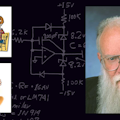I was reading the junk mail on my breakfast table, and listening to Garrison Keillor's NEWS FROM.... Suddenly, I jumped up and strode to the dining room, where my computer was simmering away. Why the rush? Because if I didn't jot this down quickly, I might not have remembered to do it correctly. I was at a lecture, a couple of years ago, when a guy asked me a good question. If I could find a guy to ALWAYS ask me such juicy questions, I would put him on my payroll, pronto.
The guy inquired, "Mr. Pease, how are we going to get a lot more analog circuit engineers?" I don't get a question like THAT, every day. So, I figured I should cook up a good response. I replied that "I don't want a lot of engineers to hire. I just want a few good ones. Think about the law of supply and demand. If the supply were greater than the demand—what does that say about the VALUE per unit? After all, what if there were twice as many engineers in this conference room—and we each got paid half as much as we are now paid? Do you think THAT is a good idea? I don't think so."
Now, let's think about the rules of supply and demand. If there's a lot of demand—suddenly—and there's no way to instantaneously increase the supply, then the commodity will be priced highly. H'mmmm.
How about RF engineers? I was asked at a press conference in Tokyo, how will the industry fulfill its needs for analog engineers, such as dc, audio, and RF engineers? I explained that analog is analog. It's challenging to teach—and to learn. But, RF is an ART that's very different from all the other aspects of analog stuff, and it requires new insights. I probably would never make a good RF engineer, even though I'm able to make pulsed circuits work cleanly, as fast as 200 MHz. RF is NOT just a higher-frequency extension of analog circuits. It's not quite like analog circuit design or analysis. It requires some art and insights, that certainly seem different to me. If the RF people say that they have different skills and different insights, I'm NOT going to argue with them.
Are schools putting out good RF engineers? Recently, I ran into a senior who had studied RF. I suggested that we hire him PRONTO, because there aren't a lot of schools that teach RF design. I was reading the University of California at Santa Cruz (UCSC) course bulletin, and found they are teaching many kinds of hardware, software, and systems engineering in their curriculum. Analog Circuits? RF design? Forget that obsolete stuff. It's not trendy, and you can't do it with just a computer—with no thinking required!
From where do we hire engineers? Well, we do hire some of them from conventional schools. For example, UC Berkeley actually has a few courses in analog circuits. And, they do have one course in RF. (Of course it's called RF and wireless technology).
As far as I'm concerned, I DON'T expect to be able to hire an engineer right out of school. I want a person with just the right amount of basics that he learned in school. Then, I expect that guy to be learning the ropes. One time, I hired the best TV repairman in Tehran. HE was GOOD at lots of things. Usually, he learned faster than I taught him.
Other times, I prefer to hire good technicians. Once they're a little experienced, THEY start to do real engineering work. Some have become REAL design engineers. (Hey, many people may study engineering. But it used to be easier, in the old days, to learn DESIGN, as you could study the schematics of good oscilloscopes, DVMs, or meters. Back then, designing circuits wasn't as obscure as it is now. These days, many digital functions are well-hidden in secret chips.)
A while back, we interviewed 10 young guys. (I think I recall, one was a woman; I'm kind of a unisex writer, and there are male and female "guys.") They all seemed to have fairly equal qualifications. So, we hired who we thought were the two best candidates.
One was adequate, a fairly competent engineer. The other learned very fast, figured things out, and made things happen. What was the deal? Why was he a much better young engineer than all the rest? Why didn't we recognize this earlier? We checked back and found the "difference." He was a hobbyist, who liked to design and build little circuits. He enjoyed making them work! That gave him the excellence we saw in his performance on the job.
"Supply and demand" is a cruel mistress. In my next column we'll discuss the other side of the coin—"Compensation Part III."
All for now. / Comments invited!
RAP / Robert A. Pease / Engineer
[email protected]–or:
Mail Stop D2597A
National Semiconductor
P.O. Box 58090
Santa Clara, CA 95052-8090
About the Author

Bob Pease
Bob obtained a BSEE from MIT in 1961 and was a staff scientist at National Semiconductor Corp., Santa Clara, CA, for many years. He was a well known and long time contributing editor to Electronic Design.
We also have a number of PDF eBooks by Bob that members can download from the Electronic Design Members Library.